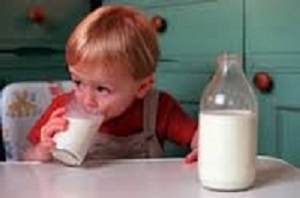Children, who drink non-cow’s milk such as rice, almond, soy or goat’s milk, have lower levels of vitamin D in their blood than those who drink cow’s milk, according to a new study.
Non-cow’s milk is becoming increasingly popular because of perceived health benefits, milk allergies or lactose intolerance.
“Children drinking only non-cow’s milk were more than twice as likely to be vitamin D deficient as children drinking only cow’s milk,” said Dr. Jonathon Maguire, a pediatrician and researcher. “Among children who drank non-cow’s milk, every additional cup of non-cow’s milk was associated with a five per cent drop in vitamin D levels per month.”
Vitamin D is an essential nutrient produced through sun exposure or found in fortified cow’s milk, fish and other foods. It plays an important role in the development and strengthening of bones. In children, low levels of vitamin D can cause bone weakness and, in severe cases, rickets — a condition causing the bones to become soft and weak and potentially leading to bone deformities.
Dr. Maguire said, “People need to be aware of the amount of vitamin D, calcium and other nutrients in alternative milk beverages so they can make informed choices for their children.”
The study involved 3,821 healthy children ages one to six. Researchers looked at differences in blood levels of vitamin D associated with drinking cow’s milk and non-cow’s milk.
“Our findings may also be helpful to health care providers working with children who regularly consume non-cow’s milk due to cow’s milk allergy, lactose intolerance or dietary preference,” said Dr. Maguire.
Eighty-seven per cent of children involved in the study drank predominantly cow’s milk and 13 per cent drank non-cow’s milk.
Source: Science daily
N.H.Kh

